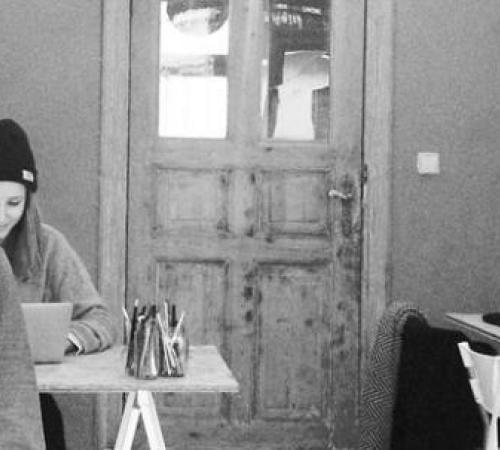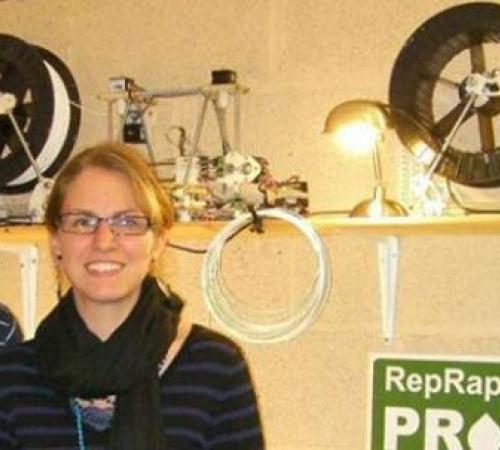

Why did you want to set up your own business?
In my early career I worked for two companies that were really dynamic. I was at the advertising agency Yellowhammer in the 1980s. Then I went freelance and got the job of launching an eyewear publication in Europe for an American trade-publication company, Jobson Publishing. The magazine was called 20/20 EUROPE.
Both of those experiences kick started my future career. They were also both founder-owned companies as well as being brilliant to work for. I went freelance when I had children and lived abroad for six years, but when I came back to the UK I decided I wanted to set up my own agency.
I thought to myself ‘I really want to run a company like those two’. I wanted to create a dynamic company, combining creative and business people from different cultures, and that’s what we have here at theblueballroom.
Where did you get the idea for your start-up?
When I worked in advertising I developed a niche for myself within the agency for customer magazines, which then expanded into magazines for employees. I felt I had found the area in which I really loved working.
While I lived in Belgium in the 1990s I worked for DHL as its European manager for internal communications. It was my first and only corporate job, and I was very lucky because DHL was way ahead of its time in putting a lot of investment into internal communications. It regarded its couriers as the face of the company, years before other firms cottoned onto this idea.
When I returned to the UK, “internal brand alignment” was the big new phenomenon in the marketing business. It struck me that this was what I’d been doing for my whole career, only I hadn’t called it that. I looked at the marketplace and saw a number of marketing and design agencies that were trying – but failing – to do internal communications.
There were also several HR agencies doing it, but the material they produced was worthy but deadly dull. I saw there was an opportunity for a creative agency that knows about business. That’s how I branded theblueballroom: we bring strategic thinking into creativity and vice versa – all at a very realistic business level.
From where did you get the start-up capital for it?
I didn’t get any capital, because I didn’t need any. For the first 18 months I was a sole-trader freelancer, but during that time I built up a network of other freelancers to work as a virtual agency. In 2001 I thought it was time to set up a proper company.
My first big decision was to rent an office. It cost £600 a month and my first thought was: ‘Will I earn an extra £600 every month to pay for this?’ But the business grew and slowly became more structured. In 2003 we hired our first full-time employee.
I made the conscious decision to grow the business slowly, because I didn’t want to take on any debt. I simply didn’t want the risk that comes with that. I decided to keep the freelance network going, and only ever took on a full-time employee when we had secure revenue to pay them.
What’s been your biggest achievement?
That we work for Deutsche Post DHL – a company that is one of the world’s biggest employers. Even though we are tiny in comparison to other agencies they use, we fought really hard to win Deutsche Post’s business, and we continue to work very hard to keep it.
DHL had already been our biggest client for 3 or 4 years, when it was taken over by Deutsche Post. Many small suppliers decided they weren’t even going to pitch for business from the new owners, but I decided we had to stand and fight for the business we had with DHL. We couldn’t walk away, because we had too much to lose.
We had also had the business nous to see what was coming as Deutsche Post gradually increased its stake in DHL. So by the time the final takeover occurred we had already taken on our first German-speaking account manager and the whole team had gone through German business and inter-cultural training.
We were determined to make it as hard as we could for Deutsche Post to do without us. We travelled over to see them regularly, and although we were small, we behaved as if we were big, and remembered what it was they hired us for.
In fact, the new contract we won with Deutsche Post was far bigger than that which we previously had with DHL and as a result, in 2005-6, our turnover doubled. We wouldn’t have been able to do that if we were still a bunch of freelancers working in my spare room.
What’s been your biggest mistake?
I didn’t think about profitability early enough. It’s a really important lesson for any entrepreneur who wants to grow their business. I thought that any business is good business, but that resulted in us losing money on a few clients. But there came a turning point between being a freelancer and being the boss of a company and I had to make some hard, financial decisions that not everyone liked.
Also, I think I’ve been too collaborative at times. We have a very open culture here, but I’ve been guilty of asking too many people for their opinions, which has slowed down the decision making process.
How has your business plan changed since you started out?
In the beginning I wanted to convince the world of the value of internal communications. So I targeted firms that I thought were useless at customer service. The trouble was I didn’t make any money for a few years, because these companies just didn’t get what I was talking about.
Things started to take off when I switched to targeting companies that I saw were already interested in employee engagement, because they understood what value it offered them.
Our strategy also had to change after we started to incur fixed overheads and I felt at a particular point that we were far too reliant on one or two big clients. So we started marketing heavily here in the UK, so we could win some more clients and stabilise the risk.
Also, in 2008 we set up a PR firm, thebluedoor, because clients asked us to handle their external as well as internal communications. But, after a couple of years, although we had two successful, but very small, firms, we realised that the market, and our clients had begun to view communications in a more integrated way, so their internal and external communications began to converge. As a result, in 2012 we merged the two companies together.
So what’s the next step?
It’s to really drive home the idea that combining your internal and external communications can really achieve incremental benefits. New technology, such as social media, is accelerating the change in the way in which people relate to business and we can help companies adapt.
Traditionally we have worked with very large corporates but now, lots of SMEs realise they can play in the bigger league, if they change the way they communicate with their customers and staff. We offer combined experience of digital PR and internal business dynamics so we can help them to do that.
I’m also looking for growth in other ways. It might come with new people joining the company, or there are complementary services we can offer, so I’ll be looking to create more partnerships. That’s me, the mature entrepreneur, speaking; I realise now we don’t have to do everything ourselves.
Do you have any business heroes?
No, but I have an enormous respect for every woman who manages to balance running a business and having a family. It’s an irrefutable fact that women take more responsibility at home than their partners, and I have a lot of time for those who just get on and do it. I admire my mother, who combined running a home with having a teaching career.
I also hugely respect Lady Judge, the Chairman of the Pension Protection Fund. She has been a trailblazer in her career – the youngest-ever Commissioner of the US Securities and Exchange Commission, the first woman main board executive director of a London merchant bank – while remaining really down to earth – and incredibly glamorous as well!
What makes a good entrepreneur?
Passion. It makes you better at selling, because people see you really believe in what you’re offering, and it also makes you a good person to work for.
Taking decisions quickly every day, without agonising about all the things that can go wrong. I’ve made decisions – some of them right and some of them wrong – but I didn’t regard them at the time as taking risks, but others have since told me they were.
You also have to be quite thick skinned, because people will say no to you a lot, or “you can’t do it that way.”
Which three tips would you give to someone thinking of setting up a business?
You’ve got to love what you do, because you can’t succeed if you’re pretending.
You need to work out what’s important to you and what sacrifices you are prepared to make to realise your ambitions. I’ve had to work 60-80 hour weeks for years, but there are times when I’ve had to say no for the sake of my family.
When you’re successful people allow you that balance, but when you’re trying to build a business they can be very unforgiving. I was asked to attend a pitch for an important piece of business once, but had to say no because I was away for my annual 2-week summer holiday with my husband and three young children. The pitch was a disaster and that client didn’t ask me back again for two or three years. That really hurt – I still almost weep today when I think back about it.
Also, take time out without your Blackberry. I manage to do that occasionally. Entrepreneurs risk burning out if they can’t switch off.
Disclaimer:
At Hiscox, we want to help your small business thrive. Our blog has many articles you may find relevant and useful as your business grows. But these articles aren’t professional advice. So, to find out more on a subject we cover here, please seek professional assistance.




